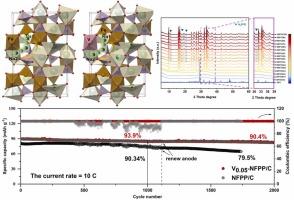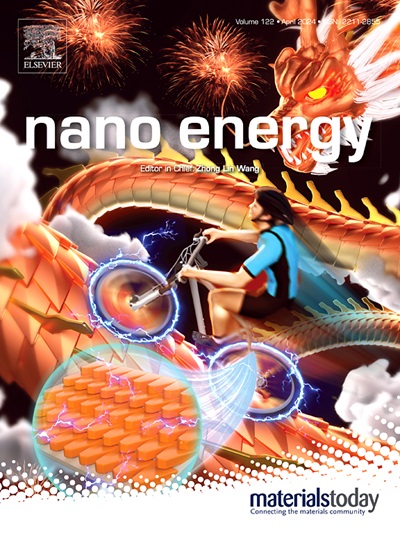具有超高动力学性能的空心球形 Na3.95Fe2.95V0.05(PO4)2P2O7 抑制非活性 Maricite-NaFePO4
IF 16.8
1区 材料科学
Q1 CHEMISTRY, PHYSICAL
引用次数: 0
摘要
钠离子电池被认为是优秀的储能电池材料,具有成本低、可再生的特点。作为钠离子储能电池的重要组成部分,正极材料引起了全世界科学家的极大关注。最近,理论容量为 129 mAh g-1 的 Na4Fe3(PO4)2P2O7 (NFPP) 引起了广泛关注。然而,在合成过程中形成的非活性海泡石 NaFePO4(NFP)和低容量 Na2FeP2O7(Na2FPO)限制了其容量利用率,而较差的导电性则进一步限制了其电化学性能。为了解决这些问题,本文合成了 Na3.95Fe2.95V0.05(PO4)2P2O7/C (V0.05-NFPP/C)复合材料,并将其组装成电池进行测试。钒离子通过抑制海泡石 NFP 和参与电化学反应提高了电池的动态性能。此外,在第一原理计算的帮助下,通过原位 XRD 图揭示了 V0.05-NFPP/C 的钠离子存储机制,并探索了烧结过程中的相变机制。本文章由计算机程序翻译,如有差异,请以英文原文为准。

Hollow spherical Na3.95Fe2.95V0.05(PO4)2P2O7 suppressing inactive Maricite-NaFePO4 with ultrahigh dynamics performance
sodium ion batteries are considered as excellent energy storage battery materials with the characteristic of low cost and renewability. As a critical component of sodium-ion energy storage batteries, cathode materials have attracted great attention from scientists around the world. Recently, Na4Fe3(PO4)2P2O7 (NFPP) which offer a theoretical capacity of 129 mAh g−1 has garnered widespread attention. However, the formation of inactive maricite NaFePO4 (NFP) and low capacity Na2FeP2O7 (Na2FPO) during the synthesis process restricts the capacity utilization, while poor conductivity further limits its electrochemical performance. To address these issues, here, Na3.95Fe2.95V0.05(PO4)2P2O7/C (V0.05-NFPP/C) composite material was synthesized and assembled into cell for testing. A capacity of 114 mAh g−1 was given at 0.1 C and rate performance also represent 90 mAh g−1 at 10 C. Vanadium-ion improves the dynamic performance by inhibiting maricite NFP and participating in electrochemical reactions. Furthermore, sodium-ion storage mechanism of V0.05-NFPP/C was revealed by ex-situ XRD patterns with the assistance of first-principles calculations, and the phase transformation mechanism during the sintering process was explored.
求助全文
通过发布文献求助,成功后即可免费获取论文全文。
去求助
来源期刊

Nano Energy
CHEMISTRY, PHYSICAL-NANOSCIENCE & NANOTECHNOLOGY
CiteScore
30.30
自引率
7.40%
发文量
1207
审稿时长
23 days
期刊介绍:
Nano Energy is a multidisciplinary, rapid-publication forum of original peer-reviewed contributions on the science and engineering of nanomaterials and nanodevices used in all forms of energy harvesting, conversion, storage, utilization and policy. Through its mixture of articles, reviews, communications, research news, and information on key developments, Nano Energy provides a comprehensive coverage of this exciting and dynamic field which joins nanoscience and nanotechnology with energy science. The journal is relevant to all those who are interested in nanomaterials solutions to the energy problem.
Nano Energy publishes original experimental and theoretical research on all aspects of energy-related research which utilizes nanomaterials and nanotechnology. Manuscripts of four types are considered: review articles which inform readers of the latest research and advances in energy science; rapid communications which feature exciting research breakthroughs in the field; full-length articles which report comprehensive research developments; and news and opinions which comment on topical issues or express views on the developments in related fields.
 求助内容:
求助内容: 应助结果提醒方式:
应助结果提醒方式:


